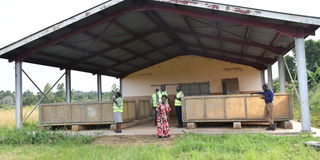Red tape frustrates Gulu fish project

Gulu fish fry project site in Pece-Laroo Division in Gulu City. PHOTO/TEDDY DOKOTHO
What you need to know:
The project faces bureaucratic disputes over land titles, contractor abandonment, and lack of accountability among involved parties.
In Gulu City, the once-promising regional fish fry centre now stands as a symbol of lost opportunities and unresolved disputes.
Mr Paul Oling, the chairperson of the Ariaga-Laliya Cell in Pece-Laroo Division in Gulu City, has taken matters into his own hands, using a machete to clear grass that has covered the once-prominent pathway to the Gulu regional fish project site.
Inside the facility, several ponds appear silted and covered after more than a decade of abandonment. Those that still hold water are inhabited not by fish, but by frogs hiding under layers of algae.
Mr Oling says the community has lost hope. “Nobody wants to speak about it because it is a disappointment. Since 2015, no single fish has come out of this place. Children now turned it into a swimming pool, they come inside here to swim in the ponds during rainy seasons.”
The roots of this problem trace back to 2007 when the Ministry of Agriculture allocated Shs1.8 billion from the African Development Bank to construct the facility. The contract stipulated the creation of 22 fish ponds, three reservoirs, a hatchery unit, and an administrative block. However, the project went awry as the contractor, GQ Investment Ltd, abandoned the site. Construction that should have taken a year dragged on until 2015.
Mr Emmanuel Omara Pacoto, the Gulu District Fisheries Officer, says the district made multiple attempts to revive the project, leading to the involvement of a new contractor, P&D Traders and Contractors Ltd, supported by Gotino Construction Specialist Ltd, in May 2015. But the new contractor also left before November of the same year.
The district, according to Mr Omara, followed up on the matter with the ministry; however, no clear explanation was given.
In 2020, the district subleased the facility to Agromax Uganda Ltd, rebranding it as the Gulu Aquaculture Research and Development Centre. The agreement aimed to promote aquaculture while securing annual rent of Shs25 million for the district.
However, a dispute erupted when Agromax insisted on obtaining the land title in their name before assuming full control, a demand the district was unprepared to meet. The conflict escalated, prompting the district to refer the matter to the State House Anti-Corruption Unit for investigation.
Responses
Mr Rony Joseph Oved, the managing director of Agromax Ltd, attributed the project’s stagnation to delays in securing the land title.
“Agromax Ltd is ready with all the relevant financing, resources and expertise to start the repair works and move to full operations, serving the fish farmers in the Acholi,” he says.
Mr Joseph Bwanika, the assistant commissioner of Aquaculture in the Ministry of Agriculture, when contacted, stated that it was impossible to trace records of the fish project.
He expressed uncertainty about the project’s status, suggesting that the district and ministry need to reconcile their records.
“I don’t know, maybe that was the district and you confirm with the district then we will get the details of what was the system and flow of things at that time and then we know where it is now. They may have probably had authority over some structures because the district is independent of MAAIF,” Mr Bwanika says.
Mr Denis Mulindwa, the director of P&D traders and contractors, says they left the site after completing the work that was assigned to them.
“We only finished what the district assigned to us, we did our work as per the scope that had been assigned to us. We completed work that was certified and paid, if there were duties beyond that maybe it was supposed to be for another service provider,” Mr Mulindwa says.
The project
The Gulu regional fish project, originally capable of producing up to two million fish fingerlings per production cycle, now stands idle. This has had repercussions for local farmers and the district’s revenue.
Agromax was supposed to be paying the district local revenue.
Ms Carolyne Nabwire, a fish farmer, says they have been having a problem accessing fingerlings, and fish feeds.
“I used to go up to Western Uganda to get my fingerlings, which is very costly,” she adds.




